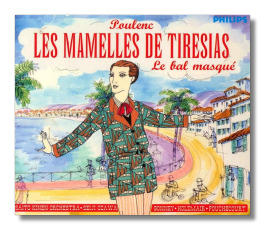
The Internet's Premier Classical Music Source
Related Links
- Poulenc Reviews
- Latest Reviews
- More Reviews
-
By Composer
-
Collections
DVD & Blu-ray
Books
Concert Reviews
Articles/Interviews
Software
Audio
Search Amazon
Recommended Links
Site News
 CD Review
CD Review
Francis Poulenc

Les mamelles de Tirésias
- Les mamelles de Tirésias 1
- Le bal masqué 2
1 Barbara Bonney (Thérèse)
1 Jean-Paul Fouchécourt (husband)
1 Wolfgang Holzmair (gendarme)
1 Tokyo Opera Singers
2 Wolfgang Holzmair (baritone)
Saito Kinen Orchestra/Seiji Ozawa
Philips 456604-2 72:20
The plot of this 1944 farce, based on a 1903 play by Guillaume Apollinaire, is every bit as loony as the music. After a quiet orchestral introduction, Thérèse of Zanzibar becomes a feminist, decides she'd rather be a soldier than a housewife, causes her breasts to rise like balloons, and pops them with a cigarette lighter. As she feels her beard growing, she congratulates herself with a brisk paso doble. Her husband separates from her and assumes the female role, producing 40,000 children in one day! In a totally unrelated scene, two drunks emerge from a café and dance a spirited polka, then amiably shoot each other. As Thérèse, Barbara Bonney combines the right balance of daffiness and self-righteousness. She is not averse to making a fool of herself in the service of character. And Jean-Paul Fouchecourt is wonderfully pompous and pathetic as the husband.
The opera is packed with dancing and catchy tunes. The finale of the first act is a marvelous piece of ensemble singing, where everyone sings faster and faster, exhorting the population to breed. At the Entr'Act, a stately gavotte effuses and the Chorus sings in the style of a patriotic anthem, punctuated by the Chorus of the Newly Born screaming "Papa." In the following aria "Vous qui pleurez," the satire on patriotic babyism reaches a high point as the husband claims his happiness is complete, since he has reproduced so effectively. Then the Chorus of the Newly Born sings "Tra la la" so piercingly, he screams "Silence!" at them. Quite rhythmically too.
The opera's subversion becomes even more apparent in the duo between the ungrateful son and the father. The melodies are in mock-Puccinian style as the son tries to blackmail the father, who, even after he kicks the wastrel out, wants to reproduce a "tailor baby" (tailor-made?). He also thinks that the more babies he makes, the richer he'll become! He believes they'll take care of him, giving him proceeds from their novels, performances, etc. The opera ends with a raucous stretta, which is yet another silly exhortation to repopulate France after the war. Even when Poulenc tries to be serious, he can't suppress his impish side.
The companion piece on this disc, the 1932 Le bal masqué, has nothing to do with a masked ball. Set to the surrealistic poems of Le Laboratoire by Max Jacob, the characters are delightful, even though the poetry is incomprehensible. It reminds me of the poems I attempted as a college sophomore. The music is filled with four-square melodies and dance and march rhythms. The rapid tempo shifts and the cornet and oboe of the opening piece is nightmare-like in its irrational precision. It is like Satie's later music, his 1924 ballet Mecure, for example in its use of parody.
I heartily recommend listening to this disc, particularly if you want to be rescued from a dour mood.
Copyright © 1999, Peter Bates


















